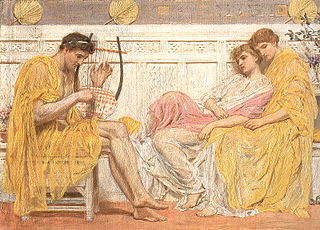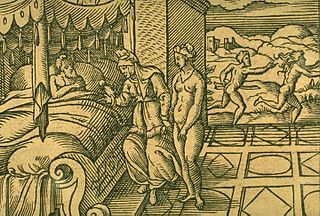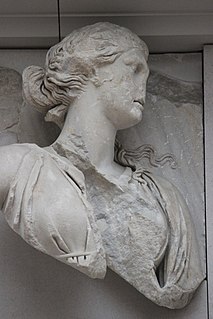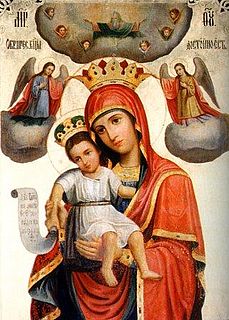Related Research Articles

Aeacus was a mythological king of the island of Aegina in the Saronic Gulf.

In Greek mythology and religion, Eos is the goddess and personification of the dawn, who rose each morning from her home at the edge of the river Oceanus. Like Roman Aurora and Rigvedic Ushas, Eos continues the name of an earlier Indo-European dawn goddess, Hausos. Eos, or her earlier Proto-Indo-European (PIE) ancestor, also shares several elements with the love goddess Aphrodite, perhaps signifying Eos's influence on her or otherwise a common origin for the two goddesses. In surviving tradition, Aphrodite is the culprit behind Eos' numerous love affairs, having cursed the goddess with insatiable lust for mortal men.

Poseidon was one of the Twelve Olympians in ancient Greek religion and myth, god of the sea, storms, earthquakes and horses. In pre-Olympian Bronze Age Greece, he was venerated as a chief deity at Pylos and Thebes. He also had the cult title "earth shaker". In the myths of isolated Arcadia he is related with Demeter and Persephone and he was venerated as a horse, however it seems that he was originally a god of the waters. He is often regarded as the tamer or father of horses, and with a strike of his trident, he created springs which are related with the word horse. His Roman equivalent is Neptune.

Bacchylides was a Greek lyric poet. Later Greeks included him in the canonical list of Nine Lyric Poets, which included his uncle Simonides. The elegance and polished style of his lyrics have been noted in Bacchylidean scholarship since at least Longinus. Some scholars have characterized these qualities as superficial charm. He has often been compared unfavourably with his contemporary, Pindar, as "a kind of Boccherini to Pindar's Haydn". However, the differences in their styles do not allow for easy comparison, and translator Robert Fagles has written that "to blame Bacchylides for not being Pindar is as childish a judgement as to condemn ... Marvell for missing the grandeur of Milton". His career coincided with the ascendency of dramatic styles of poetry, as embodied in the works of Aeschylus or Sophocles, and he is in fact considered one of the last poets of major significance within the more ancient tradition of purely lyric poetry. The most notable features of his lyrics are their clarity in expression and simplicity of thought, making them an ideal introduction to the study of Greek lyric poetry in general and to Pindar's verse in particular.

In ancient Greek religion and mythology, Helios is the god and personification of the Sun. His name is also Latinized as Helius, and he is often given the epithets Hyperion and Phaethon. Helios is often depicted in art with a radiant crown and driving a horse-drawn chariot through the sky. He was a guardian of oaths and also the god of sight. Though Helios was a relatively minor deity in Classical Greece, his worship grew more prominent in late antiquity thanks to his identification with several major solar divinities of the Roman period, particularly Apollo and Sol. The Roman Emperor Julian made Helios the central divinity of his short-lived revival of traditional Roman religious practices in the 4th century AD.
Asopus is the name of four different rivers in Greece and one in Turkey. In Greek mythology, it was also the name of the gods of those rivers. Zeus carried off Aegina, Asopus' daughter, and Sisyphus, who had witnessed the act, told Asopus that he could reveal the identity of the person who had abducted Aegina, but in return Asopus would have to provide a perennial fountain of water at Corinth, Sisyphus' city. Accordingly, Asopus produced a fountain at Corinth, and pursued Zeus, but had to retreat for fear of Zeus' terrible thunderbolt.

In Greek mythology, Amphiaraus or Amphiaraos was the son of Oicles, a seer, and one of the leaders of the Seven against Thebes. Amphiaraus at first refused to go with Adrastus on this expedition against Thebes as he foresaw the death of everyone who joined the expedition. His wife, Eriphyle, eventually compelled him to go.

Pindar was an Ancient Greek lyric poet from Thebes. Of the canonical nine lyric poets of ancient Greece, his work is the best preserved. Quintilian wrote, "Of the nine lyric poets, Pindar is by far the greatest, in virtue of his inspired magnificence, the beauty of his thoughts and figures, the rich exuberance of his language and matter, and his rolling flood of eloquence, characteristics which, as Horace rightly held, make him inimitable." His poems can also, however, seem difficult and even peculiar. The Athenian comic playwright Eupolis once remarked that they "are already reduced to silence by the disinclination of the multitude for elegant learning". Some scholars in the modern age also found his poetry perplexing, at least until the 1896 discovery of some poems by his rival Bacchylides; comparisons of their work showed that many of Pindar's idiosyncrasies are typical of archaic genres rather than of only the poet himself. His poetry, while admired by critics, still challenges the casual reader and his work is largely unread among the general public.

The Pythian Games were one of the four Panhellenic Games of Ancient Greece. They were held in honour of Apollo at his sanctuary at Delphi every four years, two years after the Olympic Games, and between each Nemean and Isthmian Games. The Pythian Games were founded sometime in the 6th century BC. In legend they were started by Apollo after he killed Python and set up the oracle at Delphi. They continued until the 4th century AD.

In Greek mythology, Orthrus or Orthus was, according to the mythographer Apollodorus, a two-headed dog who guarded Geryon's cattle and was killed by Heracles. He was the offspring of the monsters Echidna and Typhon, and the brother of Cerberus, who was also a multi-headed guard dog.

In Greek mythology, Cinyras was a famous hero and king of Cyprus. Accounts vary significantly as to his genealogy and provide a variety of stories concerning him; in many sources he is associated with the cult of Aphrodite on Cyprus, and Adonis, a consort of Aphrodite, is mentioned as his son. Some scholars have proposed a connection with the minor Ugaritic deity Kinaru(m), the god of the lyre. The city Cinyreia on Cyprus was believed to have taken its name from Cinyras. According to Strabo, he had previously ruled in the city of Byblos in Phoenicia.

In Greek mythology, Theia, also called Euryphaessa "wide-shining", is one of the twelve Titans, the children of the earth goddess Gaia and the sky god Uranus. She is the Greek goddess of sight and vision, and by extension the goddess who endowed gold, silver and gems with their brilliance and intrinsic value. Her brother-consort is Hyperion, a Titan and god of the sun, and together they are the parents of Helios, Selene, and Eos. She seems to be the same with Aethra, the consort of Hyperion and mother of his children in some accounts. Like her husband, Theia features scarcely in myth, being mostly important for the children she bore, though she appears in some texts and rare traditions.
Isthmian Games or Isthmia were one of the Panhellenic Games of Ancient Greece, and were named after the Isthmus of Corinth, where they were held. As with the Nemean Games, the Isthmian Games were held both the year before and the year after the Olympic Games, while the Pythian Games were held in the third year of the Olympiad cycle.

Aegina was a figure of Greek mythology, the nymph of the island that bears her name, Aegina, lying in the Saronic Gulf between Attica and the Peloponnesos. The archaic Temple of Aphaea, the "Invisible Goddess", on the island was later subsumed by the cult of Athena. Aphaia (Ἀφαῖα) may be read as an attribute of Aegina that provides an epithet, or as a doublet of the goddess.

Axion estin, or It is Truly Meet, is a megalynarion and a theotokion, i.e. a magnification of and a Hymn to Mary used in the Divine Services of the Eastern Orthodox and Byzantine Catholic churches. It consists of a troparion and a sticheron composed in honor of the Theotokos.

Diagoras of Rhodes was an Ancient Greek boxer from the 5th century BC, who was celebrated for his own victories, as well as the victories of his sons and grandsons. He was a member of the Eratidea family at Ialysos in Rhodes.

In Greek mythology, Gaia, also spelled Gaea, is the personification of the Earth and one of the Greek primordial deities. Gaia is the ancestral mother—sometimes parthenogenic—of all life. She is the mother of Uranus, from whose sexual union she bore the Titans, the Cyclopes, and the Giants; as well as of Pontus, from whose union she bore the primordial sea gods. Her equivalent in the Roman pantheon was Terra.

The Greek lyric poet Pindar composed odes to celebrate victories at all four Panhellenic Games. Of his fourteen Olympian Odes, glorifying victors at the Ancient Olympic Games, the First was positioned at the beginning of the collection by Aristophanes of Byzantium since it included praise for the games as well as of Pelops, who first competed at Elis. It was the most quoted in antiquity and was hailed as the "best of all the odes" by Lucian. Pindar composed the epinikion in honour of his then patron Hieron I, tyrant of Syracuse, whose horse Pherenikos and its jockey were victorious in the single horse race in 476 BC.
Andron is the name of a number of different people in classical antiquity:
In ancient Greek religion and mythology, Melia, a daughter of the Titan Oceanus, was the consort of Apollo, and the mother, by Apollo, of the Theban hero and prophet Tenerus. She was also the mother of Ismenus, god of the Theban river of the same name. Melia was an important cult figure at Thebes. She was worshipped at the Ismenion, the Temple of Apollo at Thebes, and was associated with a nearby spring.
References
- ↑ "Greek Word Study Tool". www.perseus.tufts.edu. Retrieved 2021-10-04.
- ↑ "CHRYSOS (Khrysos) - Greek God or Spirit of Gold". www.theoi.com. Retrieved 2021-10-02.
- ↑ Pindar I.5.1–3
- ↑ Scholia on Pindar I.5.3., "The Sun came from Theia and Hyperion, and from the Sun came gold".
- ↑ Isthmian odes of Pindar, edited with introduction and commentary by J. B. Bury, M.A., London, Macmillan and Co., 1892, p. 92